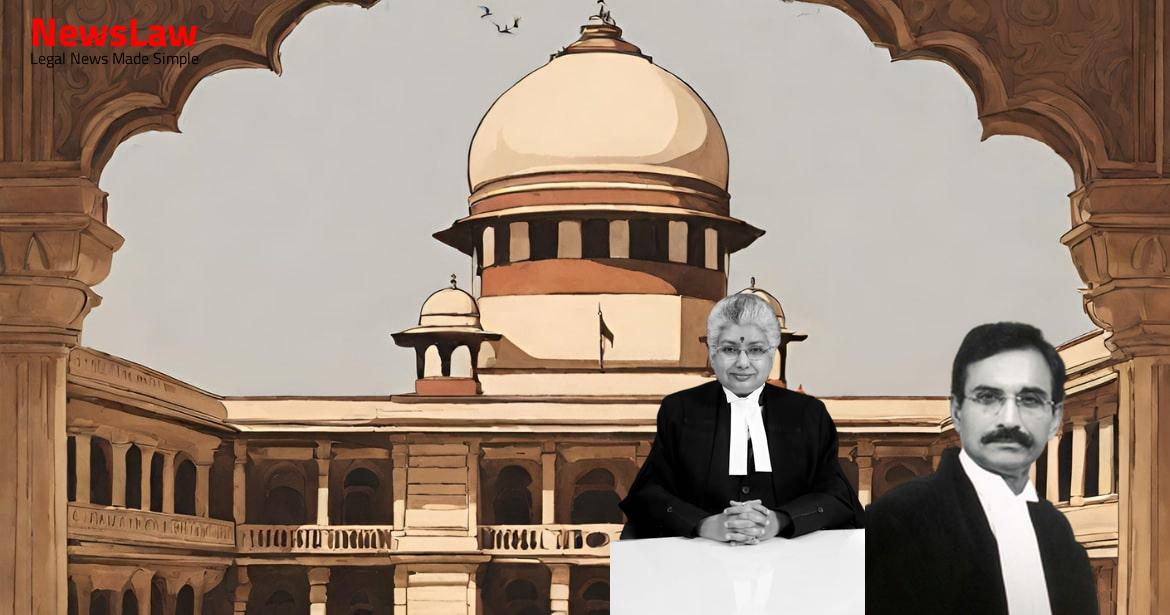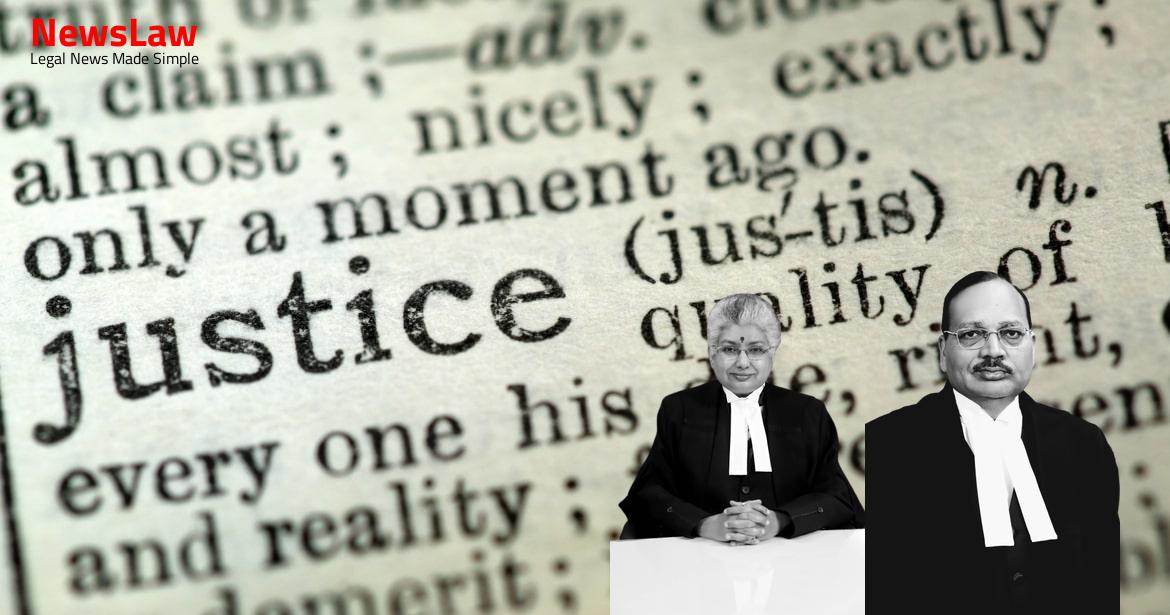Explore the intricate legal analysis of statutory limitation periods in the context of insolvency proceedings. The court’s interpretation of these specific time limits and their application in cases involving financial misconduct sheds light on the importance of procedural compliance in the legal realm. This case summary provides a deep dive into the nuances of adhering to statutory deadlines, offering valuable insights for legal professionals navigating insolvency matters.
Facts
- Appellant filed Money Suit against PD Agro and the corporate debtor in the High Court of Bombay.
- High Court injuncted PD Agro and the Corporate Debtor from disposing of their assets.
- FIR lodged against PD Agro transferred to Economic Offence Wing for investigation.
- Allegations of siphoning off funds by PD Agro to the Corporate Debtor.
- Decree passed against PD Agro for Rs. 633,66,98,350.40 in Commercial Suit No. 11 of 2014.
- Appellant submitted a claim of Rs. 673.85 crores during insolvency proceedings.
- Investigation by Directorate of Enforcement found Rs. 744 crores siphoned off to the Corporate Debtor.
- State Bank of India initiated insolvency proceedings against Dunar Foods Limited (Corporate Debtor) under IBC.
- NCLT admitted the petition and appointed Interim Resolution Professional (IRP).
- IRP rejected the claim of the appellant on 18.06.2018 citing lack of privity of contract.
- The rejection of the appellant’s claim by IRP was challenged before NCLT through Miscellaneous Application No 603 of 2018.
- NCLT, by order dated 6.3.2019, rejected the application and upheld IRP’s decision not to include the claim as a creditor.
- There was a delay of 44 days in filing the appeal, which should have been within 45 days (30 days + 15 days).
Also Read: Judicial Review of Delayed Writ Petition
Arguments
- The appellant, National Spot Exchange Limited, is seeking the condonation of a 44-day delay in filing an appeal before the NCLAT.
- The appellant argues that the delay should be excused due to the significant amount of INR 693 crores owed by PD Agro, a sister concern, which was not paid despite acknowledging the liability and promising to do so within 20 weeks.
- The appellant requests the exercise of powers under Article 142 of the Constitution of India to condone the delay.
- The appellant cites precedents such as Chitra Sharma v. Union of India, Jaiprakash Associates Limited v. IDBI Bank Limited, and Reliance General Insurance Co. Ltd. v. Mampee Timbers and Hardwares Pvt. Ltd. to support their plea for condonation beyond the IBC time limit.
- The appellant highlights the trade relationship between Dunar Foods Limited and PD Agro, emphasizing the interconnected management and financial transactions between the entities.
- The IRP vehemently opposes the appeal, relying on legal precedents like Rohitash Kumar v. Om Prakash Sharma and Union of India v. Popular Construction Co., that uphold strict adherence to statutory limitation periods.
- The Appellate Tribunal’s decision to dismiss the appeal based on exceeding the 15-day condonation limit is supported by the IRP.
- The appellant argues for the need to lift the corporate veil between PD Agro and the Corporate Debtor, alleging fraudulent activities and fund siphoning.
- Investigations by the Directorate of Enforcement reveal financial misconduct involving the siphoning off of significant funds from PD Agro to the Corporate Debtor.
- The IRP stresses the importance of adhering to statutory limitation periods set forth in the Code and resists condoning the delay beyond the specified limits.
- The decree passed in Commercial Suit No. 11 of 2014 is only against PD Agro and not the corporate debtor.
- The appellant filed a claim against the corporate debtor alleging fraud/scam by PD Agro in collusion with various entities, seeking payment of Rs. 673.85 crores from the corporate debtor.
- The appellant cannot be considered a creditor of the corporate debtor – Dunar Foods Limited, even on merits.
- Form ‘F’ dated 17.01.2018 and supporting documents show that the claim of Rs. 673.85 crores is against PD Agro.
Also Read: Ownership Dispute: Legal Analysis on Admission and Decree
Analysis
- Parliament did not need to go further in the case discussed.
- The phrase ‘but not thereafter’ would be rendered otiose if the court entertained an application to set aside the award beyond the extended period.
- No principle of interpretation justifies entertaining such applications beyond the specified period.
- A similar question was addressed by a Constitution Bench in the case of Hilli Multipurpose Cold Storage Private Limited.
- The Constitution Bench deliberated on the power of the District Forum to extend the time for filing a response to a complaint beyond the prescribed period.
- The plea to condone delay beyond the statutory period using Article 142 of the Constitution of India was discussed in the context of the Oil & Natural Gas Corporation Limited v. Gujarat Energy Transmission Corporation Limited case.
- The appellant challenged the rejection of their claim by the adjudicating authority and resolution professional before the NCLAT under Section 61(2) of the IB Code within 30 days, with a possibility of a 15-day extension for sufficient cause.
- The Appellate Tribunal can only condone a delay in filing the appeal for up to 15 days beyond the initial 30-day period as per Section 61(2) of the IB Code.
- The court held that the legislative special limitation under Section 34 of the Arbitration & Conciliation Act, 1996, excluding the applicability of Section 5 of the Limitation Act.
- The court found the NCLAT’s decision to dismiss the appeal for a delay of 44 days beyond the allowed 15-day extension justified, as the delay exceeded the specified limit in Section 61(2) of the IB Code.
- A similar scenario was considered in the case of Popular Construction Co. under Section 34 of the Arbitration and Conciliation Act, 1996, where an application for setting aside an award could not be made after three months.
- The court may entertain an application for setting aside an arbitration award within three months.
- If the applicant was prevented by sufficient cause from applying within the three-month period, the court may consider the application within a further thirty days, but not beyond that.
- The court must take into account Section 29(2) of the Limitation Act and acknowledge that the Arbitration & Conciliation Act, 1996 is a special law.
- Section 34 of the Arbitration & Conciliation Act, 1996 provides a different period of limitation compared to the Limitation Act.
Also Read: Interpretation of Statutory Limitation under Section 263(2)
Case Title: NATIONAL SPOT EXCHANGE LIMITED Vs. ANIL KOHLI RESOLUTION PROFESSIONAL FOR DUNAR FOODS LIMITED (2021 INSC 476)
Case Number: C.A. No.-006187 / 2019



